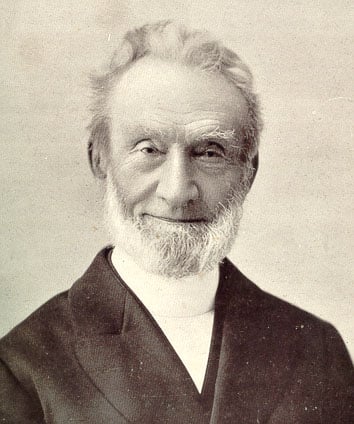Navigating Müller’s Theology


THE MAN
George Müller was born in 1805 to a family of modest wealth. His father was a tax collector and government official. By the time George was ten he was frequently stealing money from his father’s tax collections. He referred to his adolescent and teenage years as “days in much sin.”
George’s father wanted him to prepare for ministry “because of the comfortable, professional future the ministry would afford.” Things didn’t go well in his clerical education, as George drank heavily and lived beyond his means. Despite not having a personal faith, he went on to university to study for the ministry.
THE CONVERSION
At a prayer meeting in 1825, “the Lord began to perform a work of grace in him.” What started that night resulted in a personal faith, and he became a changed man, a devout Christian! In 1829 George went to London to do Jewish evangelism, but after 45 days he became very ill and was convinced that death was imminent. He prayed intently, and the Lord spared his life.
In 1832 he moved to Bristol and began pastoring a church. He promptly put an end to the “pew tax” and instead installed a box at the back of the church for offerings. The church had more income that year than in any previous year – most of which came from wealthy relatives and friends who knew of his work and newfound convictions.
A MYTH WAS BORN
In 1834 Müller started his own ministry called the “Scriptural Knowledge Institution for Home and Abroad.” (No catchy acronym for that!) For two years he did not ask for money, but wrote prolifically about needs met in the past and about the trials faced until needs were met. “He refrained from discussion of current, unmet needs.” The ministry floundered without a focus until Müller discovered the plight of English orphans. He collected funds for about 6 months, and in 1836 started the first orphanage, again placing a box outside the door. “People in town would come by and put in money as they heard of his work and felt responsive to the need.”
The early years were not good ones for the orphans or for George…they were times of trial. George prayed, yet poverty and misery prevailed—for years. Slowly, things began to change, and growth through publicity built the legend known today.
CATCHING WAVES OF GOD.
Müller caught some waves of God: the Holiness movement of the 1830’s, the Brethren movement, and the Prophetic movement, which culminated in a period of great revival in 1858-59. He was an intelligent, winsome, and personable man who had tremendous faith in God following his personal conversion. He wrote “Occasional Papers,” “Narratives,” and other printed reports and went on extensive speaking tours. In the days of sailing ships, he and his wife, who came from a wealthy family, went on 17 world tours, traveling 200,000 miles and visiting 42 countries. They were storytellers!
People increasingly heard about the work he was overseeing in the Bristol orphanages. Yes, he continued to pray, but he also faithfully reported to his ministry partners through his books, published testimonies, and speaking engagements. The root of his faith and ministry was confidence in God’s sovereign goodness. In fact, when writing to young believers (he was a mentor), his first emphasis was on reading God’s word chronologically (from start to finish), which he did over 100 times throughout his 92 years of life.
NAVIGATING THE “YES…AND”
Is it possible to navigate the theology that Müller exercised? I believe so. We need to exercise the “Yes…And” – like a weightlifter balancing equal weights where faith and works go hand in hand. Yes, we are dependent on God’s grace and goodness through prayer. And yes, He wants our faith to result in works that make His redemptive plan for the nations known. Yes, we should be giving testimony of God’s provision. And yes, we should read and know God’s Word. Yes, we need to use the tools God has given us and continue to be storytellers. And yes, “God’s people must be invited to invest God’s resources in God’s work at the amount God places on their heart.”
PRAYER AND RELATIONALLY BASED INVITATIONS
Are you internally conflicted? Not sure of how to combine the reality of our utter dependence on God (Faith: Fantastic Adventure In Trusting Him) with Jesus’ commandment to “…go and make disciples of all nations”? Are you afraid to “Ask”? The disciples did not “just pray” and neither did George Müller. Despite his reputation, he actively wrote, traveled, gave testimony of God’s nature as Jehovah Jireh—the Great Provider, and informed others of how they could participate in the gospel by being “rich in good deeds, and…generous and willing to share”.
*Note:
This blog post is derived and paraphrased from the work of Jim Killion entitled “George Müller and the Quest for Biblical Balance in Fundraising”, second edition revised, 1994, and an article/biography written by John Piper on the life of George Müller, by Mike Osborn. 1, The Third Conversion, Rodin, pg. 66. 2, Matthew 28:19a, (NIV). 3, I Timothy 6:18 (NIV).
This article is submitted by Jessica Wood of Support Raising Solutions. Support Raising Solutions is a Missio Nexus member. Member organizations can provide content to the Missio Nexus website. See how by clicking here.





